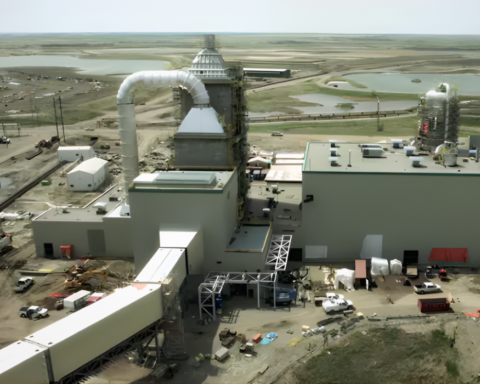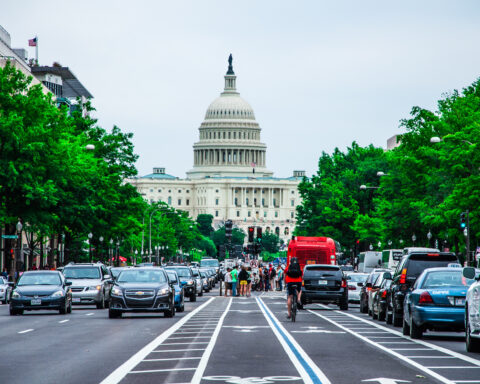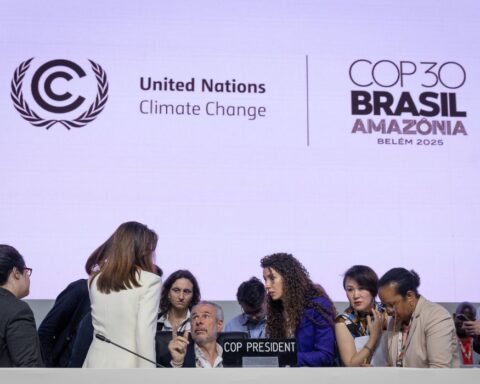The leader of the Conservative Party of Canada, Pierre Poilievre, has the appearance of a prime-minister-in-waiting, but Canadians have little sense of what his government’s climate policies would look like.
Poilievre sticks to his simple mantra: “Axe the tax,” which is to say, remove the federal surcharge on fossil fuels. Otherwise, he says virtually nothing about what – if anything – he would do to reduce Canada’s greenhouse gas emissions or drive a transition to a low-carbon economy.
His reticence is an understandable political strategy: he doesn’t want to give his opponents anything to shoot at, given his party’s yawning lead in the polls over Justin Trudeau’s unpopular, nine-year-old Liberal government. The Toronto Star’s poll tracker, done with Abacus Data and published December 4, gave the Conservatives a 20-point lead, with 38% support versus just 18% for the Liberals.
It’s clear Poilievre intends to eliminate the climate policies that the Liberals have erected over the past nine years, including the carbon tax and the oil and gas emissions cap that the government is putting into place over the objections of Alberta. In the name of deficit fighting, many of the big spending programs that subsidize technology development and adoption could come under the knife.
While Canadian actions alone can’t stop climate change, we have to be part of the solution or risk becoming globally isolated, both politically and economically.
– Benjamin Dachis, vice president of research and outreach at Clean Prosperity
But investors and corporate strategists who have made decisions based on federal climate policies face months of uncertainty and the prospect of major financial losses that would result from wholesale changes to the federal government’s approach.
Filling the Conservative climate-policy gap
In the absence of official Conservative Party of Canada policies, conservative policy experts are offering their advice for achieving a net-zero economy by 2050. The Hub, a right-leaning media platform, is partnering with market-friendly advocacy group Clean Prosperity on a series of papers that advocate for conservative leadership on climate change.
“It must be emphasized that this is no socialist scheme,” writes editor-at-large Sean Speer in an inaugural commentary this fall. “Market forces are now driving emissions reductions faster than top-down technocrats could ever aspire to.”
The approach proposed by The Hub authors relies less on carbon pricing and regulations and more on federal–provincial cooperation and support for scaling up technology solutions such as carbon capture and storage and hydrogen that can lower emissions from oil and gas, and nuclear power to decarbonize the grid.
Related
Is it time to axe the carbon tax?
Fossil fuel subsidies are costing Canadian taxpayers way more than the carbon tax
Are green conservatives the key to solving the climate crisis?
Climate advocates worry that the conservative approach of reducing carbon intensity will divert the country from the road to achieving net-zero emissions by 2050 and meeting international commitments to reduce emissions. Opponents argue that the strategy would subsidize hugely profitable oil companies to adopt technologies like carbon capture and storage, which they say are unproven at scale and would keep the economy dependent on fossil fuels.
Alex Cool-Fergus, national policy manager for Climate Action Network Canada, welcomes the conversation that The Hub and Clean Prosperity have undertaken about the need for a credible conservative climate policy. Nonetheless, she says the proposals amount to “backsliding” on climate policy. “We need greater effort, not less,” Cool-Fergus says in an interview. “These are not very serious climate solutions that are being suggested.”
Limiting Ottawa’s role in setting climate policy
David McLaughlin, a long-term conservative climate strategist, says Canada needs to move away from the confrontational approach that has bogged down in political acrimony. The country needs “a new climate federalism by reining in federal climate overreach into provincial jurisdiction and offering climate collaboration not coercion,” he wrote in a November essay. He argues that a new government should undertake a full audit of Ottawa’s climate policies and programs to determine what is working and what is not. It should then negotiate bilateral deals with provinces that would set out shared goals, action, funding and accountability.
In an interview, McLaughlin defends the notion that the federal government should work with Alberta to subsidize carbon-capture-and-storage projects in the oil industry. “We need carrots, not sticks, to get it done,” he says. “You fish where the fish are, and you cut emissions where the emissions are.”
University of Calgary economist Trevor Tombe has suggested the federal government should institute a “climate transfer” to the provinces. “Federal funding tied to emissions-reduction outcomes could help provinces tackle these challenges on their own terms,” he wrote in a Hub commentary. Tombe is a regular contributor to The Hub and adviser to various governments in Canada.
There is also widespread disaffection among conservatives with the United Nations Framework Convention on Climate Change and the focus on Canada’s targets for 2030 and 2035, which are criticized by conservatives as unrealistic and too costly. Poilievre is unlikely to feel bound by Liberal government targets that have been adopted with little provincial input.
Indeed, U.S. president-elect Donald Trump has vowed to pull out of the Paris Agreement as he did in his first term, and Poilievre could be tempted to follow Trump’s lead. (As a treaty ratified by Parliament, the accord imposes legal obligations on the federal government.) In 2011, Stephen Harper’s Conservative government withdrew Canada from the Kyoto Protocol, noting that the 1997 agreement covered neither the United States or China and that this country could not meet its commitments.
Benjamin Dachis, vice president of research and outreach at Clean Prosperity, says that doing nothing to encourage a low-carbon transition would be a poor option for a future Poilievre government. Climate change is already having costly impacts, and Canada needs to seize on the low-carbon economic growth. “While Canadian actions alone can’t stop climate change, we have to be part of the solution or risk becoming globally isolated, both politically and economically,” he wrote in a September essay.
Climate action may not be a priority for Poilievre, Dachis says in an interview; however, the party will need a “comprehensive and credible climate policy” as part of its election platform. Concerns about climate change are now a fixture of Canadian politics. While Trump has dismissed climate change as a “hoax,” Canadian conservatives generally acknowledge its reality. Pressure will only grow on governments to respond as its impacts worsen.
While determined to protect the oil and gas industries, they also know Canada risks losing the international race to reap the economic opportunities that will come with the transition to a low-carbon economy.
Shawn McCarthy is an Ottawa-based writer who focuses on climate change and the low-carbon energy economy.







